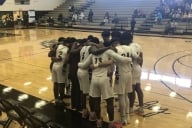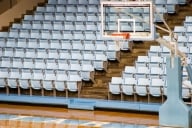You have /5 articles left.
Sign up for a free account or log in.
CHAPEL HILL, N.C. -- Holden Thorp, the soon-to-be-former University of North Carolina at Chapel Hill chancellor who resigned in the wake of an academic scandal widely believed to be centered around athletes, says he realized in summer 2010 that college presidents cannot control intercollegiate athletics.
"Presidential control was supposed to produce less corruption, make it easier to make rules, reduce escalation of money in college sports, give academics the ability to change college sports," he said Friday here on the UNC campus. "It's almost hard to keep from laughing when you say those things, because obviously, it hasn't worked."
Thorp made the controversial comments at a town hall meeting of the five-person panel he's charged with recommending ways for UNC to navigate the modern world of big-time athletics. Next year, Thorp will be provost at Washington University in St. Louis, hardly a big-time athletics powerhouse. And Carol Folt, the current president of Dartmouth College, will have taken over for him.
"I'm saying a lot more today than I would say if I wasn't going to Division III as a provost," Thorp told the nearly full lecture hall, adding that while his successor likely will not say such things due to pressure from fans and the National Collegiate Athletic Association, "hopefully my saying these things will make it easier for her."
As Hunter Rawlings, the panel chair and president of the Association of American Universities, said, Thorp's words are worth considering: "He's been through the mill." Thorp resigned after the discovery of an academic scandal involving no-show classes and inflated grades that -- though he has maintained otherwise -- is widely believed to have been designed to keep athletes eligible for competition. Before that, UNC received NCAA sanctions of academic fraud, illicit payment to athletes, and unethical conduct.
Thorp says he's come to believe that -- while he's "not saying the buck shouldn't stop here" -- presidents either need to acknowledge that "athletics is the most important part of their job," or put the athletics directors back in charge and hold them accountable if things don't work.
While the panel is focusing on UNC, Rawlings said its “bold” recommendations will be "of interest to Division I athletic programs in general," particularly those comparable to UNC. The other panel members are Jim Delany, commissioner of the Big Ten Conference; Bob Malekoff, associate professor and sport studies chair at Guilford College; Amy Perko, executive director of the Knight Commission on Intercollegiate Athletics; and Patricia Timmons-Goodson, a former associate justice of the North Carolina Supreme Court.
Attendees at Friday's town hall were mostly UNC faculty members, but their comments could apply to any one of that university's athletic peers.
"Is having alumni coming back to campus that critical in the overall educational mission of educating students?" asked Mark S. Nagel, an associate professor of sport and entertainment management at the University of South Carolina, alluding to Thorp's earlier remarks about the crucial role of athletics in keeping a university alive. "All the schools that are not at the [Bowl Championship Series] level -- are they going bankrupt? Are they unable to educate their students?"
Though the question seemed rhetorical, Thorp responded.
"I can tell you that my colleagues who are at schools that don't have what we have, where we have our logo all over the world," he said, "they are struggling."
Others were concerned with the effect of athletics on students.
"One thing that seems to be particularly intractable," said John Stephens, a UNC political science professor who is on the advisory committee for student-athlete support, is "the inordinate amount of time student-athletes spend doing sports."
"I think the determination of education-related violations belongs with the university and not with the NCAA," said Robert F. Orr, an adjunct law professor at UNC, suggesting that athletes have no rights in NCAA enforcement. The NCAA said it did not have the jurisdiction to punish UNC for the no-show classes, despite many calling for it to do so.
"I do see a problem in the way students are recruited to come and play sports," said Larry Han, a freshman who admitted athletics was part of what attracted him to UNC. "I feel like it's created almost a factory. These institutions of higher education -- the purpose has been changed in a way that I don't like and I don't think anybody else on the panel likes."
Jay Bilas, the former Duke University basketball player and current ESPN analyst who has been highly critical of the NCAA, spoke early at the meeting, suggesting that the NCAA's amateurism model is "a sham."
"We have professional athletes playing college sports right now, and the world spins on its axis just fine," Bilas said. "The athlete is the only person on a university campus who is restricted from making money beyond expenses."
Despite Bilas's charisma and commanding presence, not everyone bought into his arguments.
"Students are supposed to come to colleges and universities in order to find out more about themselves, learn more about the world, and then figure out their role as they go forward to become productive citizens," said Barbara Osborne, an associate professor of exercise and sport science at UNC, noting that athletes get free tuition, room and board, tutoring, training, top-notch facilities and the ability to brand themselves. "The whole notion that athletes aren't being compensated enough irritates the crap out of me."
The panel members themselves didn't say much at all; the purpose of the town hall was for its members to hear from campus stakeholders and soak in their ideas. Rawlings said it could make recommendations in as soon as a couple of months, or it could take longer.
A few UNC faculty members, along with Bilas, prepared presentations to lead off the meeting.
Richard M. Southall, director of UNC's College Sport Research Institute, spoke about the disparity in graduation rates between black and white athletes in revenue sports -- the gap at the typical large institution is 20 to 40 percent in football in men's basketball, Southall's research has found -- and the need to make special admissions more transparent.
To prevent future scandals like what happened at UNC last year, and to keep academics and athletics in balance, it's imperative that faculty take a stronger stand and even become "adversarial," the UNC history professor Jay Smith said.
"I'm convinced that faculty complacency contributed to the institutional breakdown from which we're still trying to recover," he said. "I don't mean to imply that they're our enemies.... The athletic department also educates, but athletic departments are dedicated first to securing the wins that bring in revenue and goodwill.
"If we're to protect that [academic] infrastructure in the future," Smith said, "we must acknowledge that we're always under siege."
Thorp said he’s fully confident that Folt, who’s coming from the less-elite Ivy League conference, will be able to manage UNC’s program -- and he previously told her that that will be the most important aspect of her job. And despite the “many different pressures” from faculty, trustees, fans and the NCAA that sometimes prevent presidents from saying what’s on their minds, Thorp is hopeful that his being open about it will make it easier.








